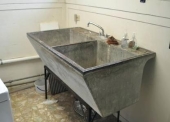
 3
3




 4
4




 2
2




Proud member of the mad farmer liberation front.
 3
3




 3
3




 2
2




Devon Olsen wrote:Do you think detergents and the like would tend to push ph lower towards acidity or higher to alkalinity?
Proud member of the mad farmer liberation front.
 3
3




 3
3




Proud member of the mad farmer liberation front.
 2
2





 1
1




Works at a residential alternative high school in the Himalayas SECMOL.org . "Back home" is Cape Cod, E Coast USA.
 1
1








